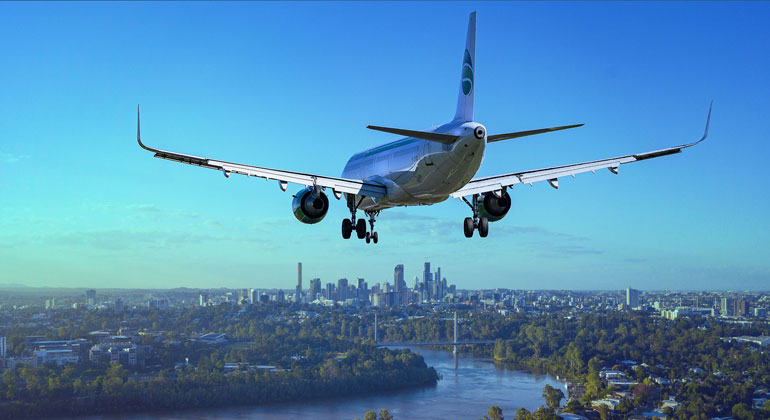Is it still acceptable to fly on holiday in view of climate change?
Yes and no, according to moral philosophy. Individual measures alone can’t stop climate change. We are therefore obliged to intervene as a collective.
Apart from a few obstinate deniers, everyone has pretty much grasped by now that climate change is caused by humans. Since 1992, global warming and its effects have been discussed at international level, and despite many efforts, it has not yet been possible to stop its progress. It is alarming. “Climate change is the greatest challenge mankind has ever faced, and there is no way to avert the threat at the last minute, as is the case with diplomatic crises, for example,” points out Dr. Anna Luisa Lippold.
In her dissertation in Applied Ethics under Professor Klaus Steigleder, she tackled a question that is of great concern to many: What individual moral obligations do we have in view of climate change? In other words: Are we still allowed to fly on holiday? Eat meat? Take milk in our coffee?
The problem is much bigger. – Anna Luisa Lippold
“Yes and no,” says Anna Luisa Lippold. She understands the compelling narrative that each and every one of us has to do their bit to reduce CO2 emissions by driving less, saving electricity and going vegan. But even if all people worldwide were to implement these measures, it wouldn’t be possible to stop climate change.
“The problem is much bigger,” says the philosophy scholar. “On average, we in Germany currently cause about nine tonnes of CO2 per capita per annum. We would have to reduce our footprint to 1.2 tonnes in order to limit climate change to 1.5 degrees – which is impossible for anyone to achieve on their own. We need to rethink the way we live. Since we can’t turn our way of life back to the Stone Age, this is impossible to achieve without massive technical innovations and the involvement of economic actors. Only collective action can bring about the necessary change.”
There is a pragmatic way
The objective of her thesis was to show a pragmatic way that examines what needs to be done within what timeframe and for what rational reasons in order to limit climate change – without advocating any ideologies. She challenges the prevailing narrative that each individual has to reduce their emissions: Since the contribution of each individual neither causes nor stops climate change, she doesn’t see the moral duty primarily and exclusively in reducing individual CO2 emissions. “Considered from this point of view, it’s okay for you to go on holiday by plane,” she says. But we’re not off the hook quite so easily.
This is because we all have the moral obligation to safeguard the rights of future generations. “Children don’t get asked whether they want to be born. It is therefore the parents who have to make provisions for their children’s lives,” stresses Lippold. A selfish attitude is not an option: “Morality is not an opinion,” as she succinctly puts it.
But what can we do about climate change if changing our own consumer behaviour is not enough? Doesn’t this mean we are helpless and powerless?
A moral obligation to interfere
It does not, according to her. She advocates the individual duty to advance collective action. Collective action includes, on the one hand, political actors. On the other hand, us as a society. “There are a number of things that are within our power: organising or participating in protests, writing to our political representatives, not penalising politicians at the ballot box for climate-protection measures and, above all, sensitising our social environment. All in all, we must promote a social climate in which ambitious climate protection is possible across party lines,” she says.
Otherwise, climate protection will stop where political power begins. Almost no-one is exempt from this moral obligation to interfere, she explains, arguing that people belong to so-called weak collectives that are morally obliged to act. The model was developed by the philosopher Elizabeth Cripps: it comprises the Young, people up to the age of about 40, who can only protect their moral rights together. This group also includes young parents. The Able, i.e. all those who have the chance to intervene, for example because of their educational background and income. And the Polluters, which include all those who together cause climate change. Almost everyone belongs to at least one of these groups, and many belong to several.
Bringing up children as climate protectors
The Young, for example, are obliged to bring up their children in such a way that they will be able to contribute to climate protection once they’ve grown up. The Able can, for example, support research or get involved in politics. Polluters are all those who cause emissions above a normatively relevant value: if we all stayed below that threshold, there wouldn’t be any climate change. “I believe that, as mankind, we can succeed in averting climate change if we all pull together,” says Anna Luisa Lippold.
But if we are aware of our duty to interfere, and if we observe it, won’t we lose credibility once we drive a big SUV and fly long distance? “Yes, we shouldn’t preach water and drink wine. For integrity reasons, I consider it my duty to limit myself – even if that’s not our main priority,” concludes Anna Luisa Lippold. Just because you give up flying, you can’t assume that you have done all that is morally necessary. But if you take climate protection seriously, you shouldn’t fly on holiday. Original publication
- Anna Luisa Lippold: Climate change and individual moral duties. A plea for the promotion of a collective solution. Mentis Verlag, Paderborn 2020, 294 pages, ISBN 9783957431851








